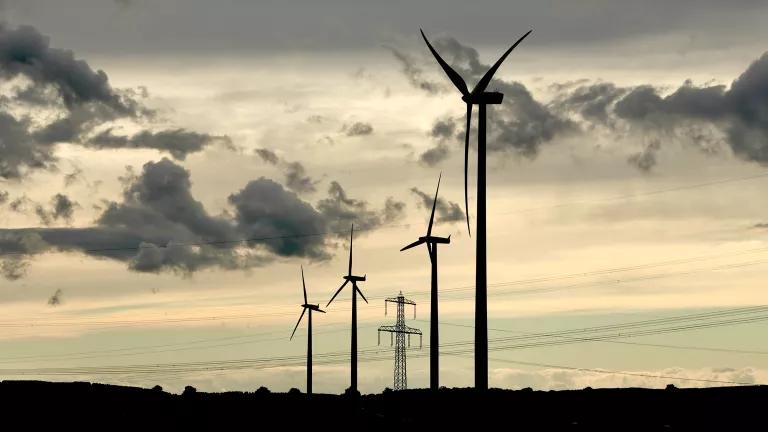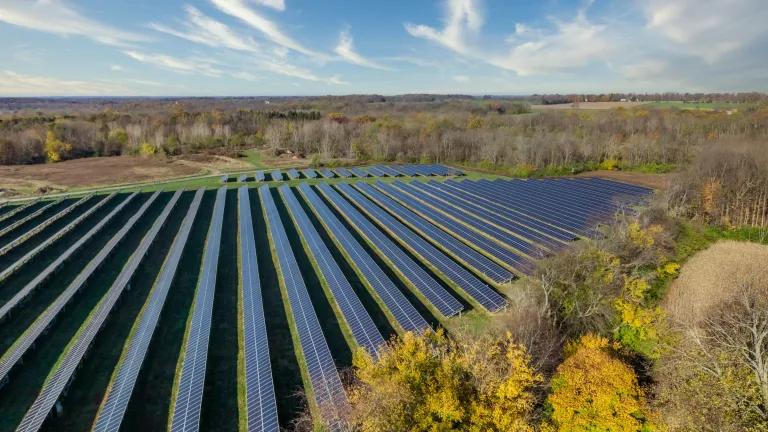Building Synergies for a Women-led Clean Energy Transition in India
On World Environment Day, a dialogue to discuss pathways for a more gender balanced clean energy transition in India.

High Level Plenary at the Women in Renewable Energy: A Dialogue on Policy, Technology, Skilling and Finance; Featuring (L-R) Akanksha Golchha (on the Podium); Ms. Dipa Singh Bagai, Country Head, NRDC India; Mr. Bhupinder Singh Bhalla, Secretary, MNRE; Mr. R.K. Singh, Hon’ble Minister of Power, New & Renewable Energy, Government of India; and Ms. Mini Prasannakumar, Deputy Director General, MNRE
NRDC India
Co-Authored with Akanksha Golchha, Charu Lata and Srinivas Ethiraj of NRDC India
Women are disproportionately affected by the impacts of climate change and at the same time are capable of bringing more effective change at the grassroots level through community engagement and household level action. This was a key theme of discussion at the “Dialogue on Policy, Technology, Skilling, and Finance,” organized by India’s Ministry of New and Renewable Energy (MNRE), in association with NRDC India, on the occasion of the World Environment Day last week in New Delhi. Convened as a part of MNRE’s Women in Renewable Energy initiative, the dialogue brought together women leaders and stakeholders across union ministries, state nodal agencies, grassroots organizations, technology-use enablers, and financial institutions to discuss challenges and identify opportunities across policy, technology, skilling and finance to scale up implementation of women-led climate-friendly solutions.

Participants at the Women in Renewable Energy: A Dialogue on Policy, Technology, Skilling and Finance
NRDC India
Bringing Women to the Forefront of the Clean Energy Transition
At the COP26 climate summit in Glasgow, Prime Minister Narendra Modi launched the Mission LiFE (Lifestyle for Environment) as a public movement to mobilize individual and community action to protect and preserve the environment. As India progresses towards creating new pathways for clean energy transition, empowering women with the right mix of policy support, access to finance and technology, and soft and technical skills training will be central not only to India’s clean energy future, but also to advancing the goals of Mission LiFE. Women-led climate action could unleash positive changes across all aspects of a women’s life – from energy access to better health, from resource governance to community resilience.
At the event last week, Smt. Mini Prasannakumar, DDG, MNRE, highlighted that it is important to acknowledge, celebrate and recognize the role of women in the renewable energy sector. Shri Bhupinder Singh Bhalla, Secretary, MNRE, brought attention to the continuously evolving energy landscape in India, and highlighted MNRE’s various policies and schemes that support India’s ambitious targets for renewable energy expansion. He also emphasized the need for more women to enter the fields of science, technology, engineering, and math (STEM), to create a technically proficient and skilled women workforce in renewable energy. He underscored the importance of robust, India-specific data on women’s participation in this field to better identify gaps and inform policymakers.
Shri R.K. Singh, Minister of Power, New and Renewable Energy, in his inaugural keynote address outlined India’s journey towards clean energy transition, the tremendous pace of adding renewable energy capacity, and critical gaps in the clean energy transition. He emphasized the gaps in education and skilling as one of the main challenges to ensuring more women in the workforce. He called for a greater focus on renewable energy in both professional and polytechnic curriculum so that more engineers and technicians, and in turn more women, are better equipped to enter the renewable energy workforce. He also noted the essential role women play in incorporating renewable energy at the household level, as well as at the grassroots level through Distributed Renewable Energy (DRE) applications.
"The future is renewable energy and the world must transition to achieve their net zero targets. Our government is committed to the environment as we believe in leaving behind a healthier planet for future generations."
Shri. R.K. Singh, Minister of Power, New and Renewable Energy, Government of India
Ms. Dipa Singh Bagai, Country Head, NRDC India, provided a vote of thanks and set the tone and direction for the day’s discussions.
"Women will play a significant role that will alter the direction of the energy transition in our country – it is no longer desirable; it is now essential."
Ms. Dipa Singh Bagai, Country Head, NRDC India
In Session 1, ‘Avenues for Policy Convergence for Effective Women-led Climate Action,’ the speakers highlighted how women are already occupying different roles in the clean energy transition either as homemakers, as community leaders, as entrepreneurs or as professionals. However, they reiterated the need for more robust, granular data on women in the clean energy workforce to better inform policy making. The discussions reiterated the need for educating, training, and skilling women on clean energy - for instance, through dedicated and targeted scholarships and internships for women, or easier access to capital for women entrepreneurs.
In Session 2, ‘The LiFE of Women: Lessons from the ground and the future of the LiFE Movement,’ several women leaders from the grassroot organizations shared their experiences of using climate-friendly and clean energy technologies. Common challenges women face are lack of access to finance and skills training; operation, maintenance, and repair of equipment; and access to markets. They shared success stories of adopting various DRE technologies at the grassroots level and underscored the importance of skilling women to scale up DRE across the country.
In Session 3, ‘Unlocking Innovation in Finance and Technology,’ speakers from various public and private sector financial institutions discussed options for unlocking greater funding for women-led initiatives. They noted how women participate in the clean energy sector as both consumers and producers, and therefore require capacity building and skills training for the use of different technologies based on their specific role. Women’s financial and technological needs also depend on the broader context in which they utilize clean energy. For instance, solar-powered storage and drying technologies could help women-based enterprises in the agriculture sector and enhance their livelihood opportunities. There is a need to identify additional, innovate financing mechanisms that could catalyze women-led climate action, such as green bonds, seed or venture capital, de-risking new and emerging technologies by relying on evidence-based research and actively collaborating with the research institutions, government-sponsored crowdfunding platform, and greater spending on research and development under existing policies and schemes of the government.
In Session 4, ‘Identifying Pathways for Skilling and Capacity Building,’ speakers from industry and civil society spoke of the existing gaps in skilling across the clean energy value chain and identified the future course of action for enabling a holistic skilling ecosystem to bolster clean energy adoption in India. Socio-cultural norms, household responsibilities, and the lack of resources to access the workforce keeps women’s participation in the clean energy sector very low. However, a greater emphasis on capacity building, soft-skills training, digital literacy, mentoring, business networking opportunities for women across the spectrum could enable better participation as clean energy user, producers, and entrepreneurs.
In closing, MNRE announced awards recognizing women across 6 separate categories: fostering a gender diverse workplace; outstanding women entrepreneurs (including startups); rural women entrepreneurs; NGOs/CSOs encouraging women to use renewable energy; women leading the change for renewable energy in urban areas; and women leading the change for renewable energy in rural areas. A full video of the event is included here:








